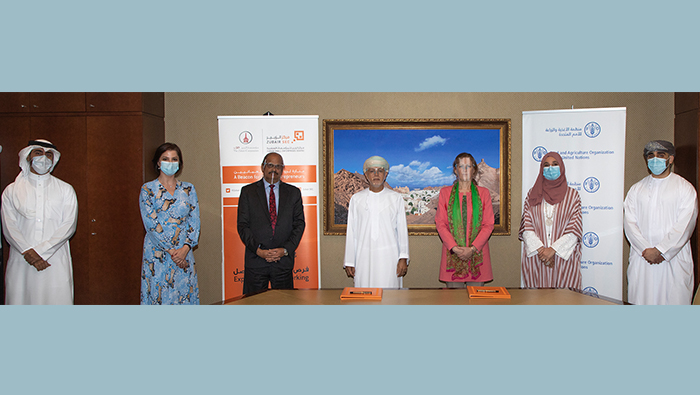
Muscat: Intending to promote sustainable food systems and contribute to the improvement of food and nutrition security in the Sultanate, the Food and Agriculture Organisation (FAO) and Zubair Small Enterprises Centre (Zubair SEC) – a social impact initiative by The Zubair Corporation - have signed a Memorandum of Understanding (MoU) to formalise their collaboration towards strengthening the role of Small and Medium Enterprises (SMEs) in achieving food security in Oman. This partnership serves as an example of multi-stakeholder efforts towards meeting the goals set by the 2030 Agenda for Sustainable Development.
The MoU was signed by Nora Ourabah Haddad, FAO Representative in Oman and Al Zubair Muhammad Al Zubair, Vice Chairman of Zubair Corporation with the attendance management representatives from both sides.
FAO and Zubair SEC realise the need for a more integrated approach to promoting sustainable food systems in Oman and the significant role SMEs can play across the value chain. The agreement encompasses various areas of collaboration that would capitalise on the shared knowledge and expertise both FAO and Zubair SEC hold to facilitate opportunities for SMEs in food systems. The areas include strengthening SMEs capacities in entrepreneurship, management and financial skills to contribute to the achievement of food and nutrition security; fostering and facilitating multi-stakeholder dialogues in relevant areas, and improving knowledge in food security related issues in the framework of Sustainable Development.
Nora Ourabah Haddad, FAO Representative in Oman said “SMEs and farmer-based organizations are key actors and agents of change to the sustainable transformation of food systems along the value chain. They are one of the central stakeholders along the food value chain in the Sultanate. Partnering with Zubair SEC is critical due to their proven track record in supporting SMEs. I commend their important contribution to the development of the SMEs ecosystem and very much look forward to expanding our collaborative efforts.”
She added, “SMEs related to the food and agriculture sector as well as farmer-based organisations require interventions to take advantage of market opportunities triggered by sustainable food systems. It is equally imperative that these interventions be socially, economically and environmentally sustainable and viable.”
Highlighting the importance of the agreement, Al Zubair Muhammad Al Zubair, Vice Chairman of Zubair Corporation said, “Our strategic approach has always been aligned with the national agenda for sustainable development in the Sultanate. At Zubair SEC we direct our efforts in a way that creates positive scalable social and economic in our country, and food security is by far a key part of such objectives.”
He added, “We are proud of the trust that a global organisation such as FAO has put in Zubair SEC to collaborate in what we believe are much-needed projects that aim at strengthening the role of SMEs in achieving food security in the Sultanate. We share many common Sustainable Development Goals and we highly appreciate this collaboration and hope this collaboration would be an opening for many more opportunities in the future.”
FAO and Zubair SEC have collaborated in the past couple of years intending to strengthen the role of SMEs in sustainable food systems in Oman. SMEs contribute to social and economic transformations through innovations in agriculture, fisheries, healthcare, education and environment. Successful joint initiatives include assessments, capacity development programs, and dialogue platforms and initiatives.
Ali Shaker, Adviser – Business Development & Strategic Partnerships at Zubair SEC said, “The most recent collaboration with FAO, the Nutrition-Sensitive Value Chain Assessment (NSVCA) project, focused on current constraints and opportunities along the value chain for selected safe and nutritious food commodities. This project will provide farmer-based organizations and SMEs access to updated knowledge and data to operate in line with current research and national priorities, in addition to a number of key proposed interventions that would enhance SME’s opportunities across the value chain.”
He added, “Farmer based organisations and SMEs along the value chain also play a key role in influencing demand and supply through the production, packaging, selling and marketing of food. We believe that the project will help food and agriculture-related SMEs to better target customers through a more comprehensive understanding of the ecosystem in which they operate.
Both parties intend to conclude this agreement to develop their cooperation to achieve their common objectives while strengthening the capacities of SMEs, to enable them to succeed and grow sustainably, and contribute to developing the agricultural sector.